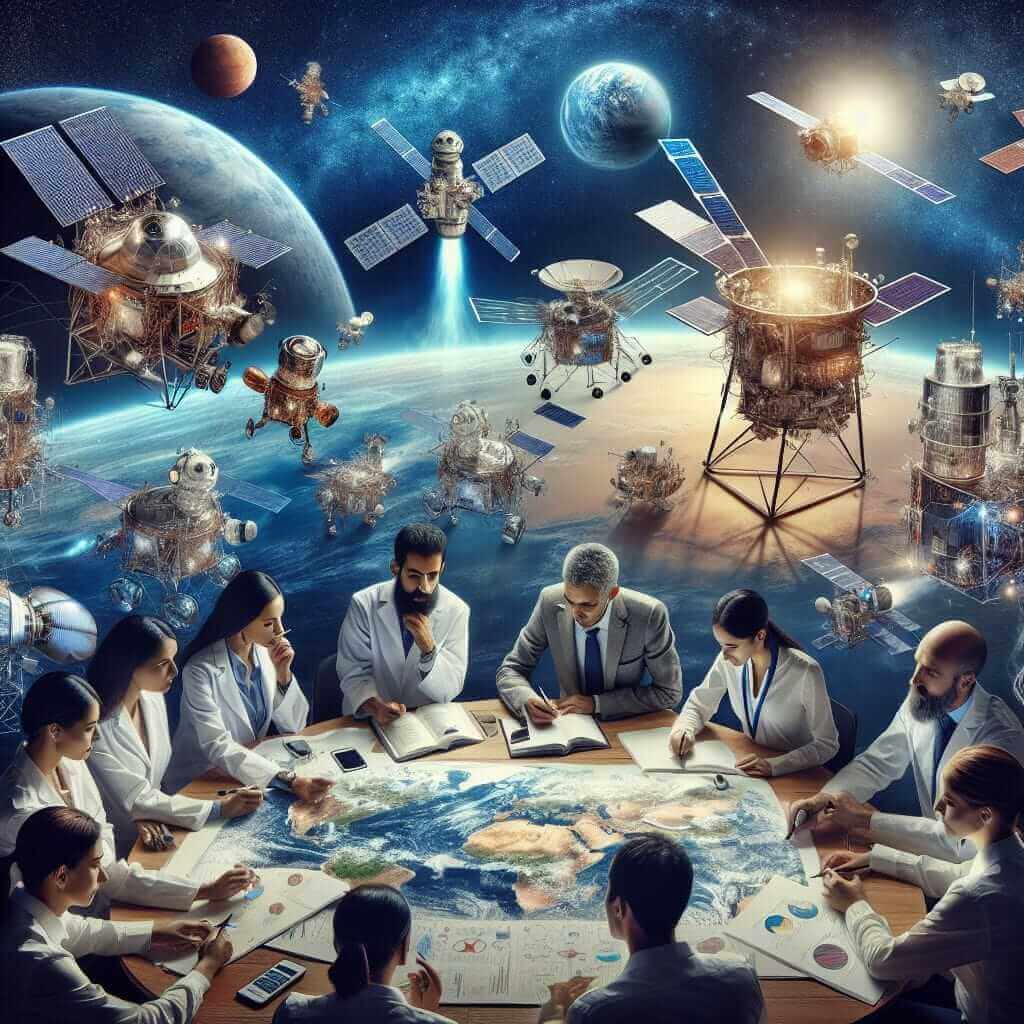The role of international cooperation in space exploration has been a critical topic in not just the scientific community, but also in the context of global diplomacy and collaborative advancements. With the increasing complexity and cost of space missions, collaboration among nations has become essential. As an IELTS candidate, it’s crucial to understand this topic as it frequently appears in Writing Task 2. Before we dive into the sample essay, let’s explore some potential IELTS Writing Task 2 questions related to this topic:
- Sample Question 1: “International cooperation is vital to the success of space exploration. To what extent do you agree or disagree?”
- Sample Question 2: “Discuss the benefits and drawbacks of international collaboration in space exploration.”
- Sample Question 3: “What are the roles and challenges of global partnerships in advancing space technology?”
Main Content
Choosing a Sample Question
For this article, we will focus on Sample Question 1: “International cooperation is vital to the success of space exploration. To what extent do you agree or disagree?”
Analyzing the Question
The prompt is asking for your opinion on whether international cooperation is essential for successful space exploration. You have three possible responses: agree, disagree, or a balanced view. The essay should encompass a structured argument with clear points supporting your stance.
Sample Essay
Introduction
The realm of space exploration has traditionally been dominated by a few pioneering nations. However, the increasing challenges and costs associated with space missions have underscored the necessity for international cooperation. This essay will discuss why such collaboration is indispensable for the success of space exploration.
Body Paragraph 1
One significant advantage of international collaboration is the pooling of resources and expertise. Space missions are economically demanding, and collaborative efforts allow multiple countries to share costs, thereby reducing financial burdens on individual nations. For instance, the International Space Station (ISS) is a remarkable example, constructed and maintained through contributions from multiple countries including the United States, Russia, and European nations. Shared funding and diverse technologies have made the ISS a successful and sustainable project.
Body Paragraph 2
Moreover, international cooperation promotes the exchange of knowledge and innovation. Different countries bring unique technological advancements and scientific insights to the table, enhancing the overall quality and safety of space missions. The collaborative Mars rover missions between NASA and the European Space Agency (ESA) exemplify this. These joint missions have led to significant discoveries by leveraging the combined scientific acumen and technical prowess of both agencies.

Body Paragraph 3
However, some argue that international cooperation can lead to political and bureaucratic challenges. Differences in political agendas and operational philosophies could potentially hamper the smooth execution of space missions. Despite this, the benefits of pooling resources and knowledge generally outweigh these challenges. Effective diplomacy and clear agreements can mitigate many of these issues, as demonstrated by long-standing cooperative projects like the Hubble Space Telescope.
Conclusion
In conclusion, international cooperation plays a pivotal role in the success of space exploration. The financial, technological, and innovative advantages that arise from such collaboration are immense. While there are challenges to be addressed, the overarching benefits make international cooperation not only desirable but necessary for advancing our understanding of space.
This perspective aligns with other experts’ opinions, further evident in various high-profile collaborative space endeavors.
Word Count: 306
Key Points to Note
- Vocabulary: Use formal and academic language. Avoid slang or colloquial expressions.
- Grammar: Ensure accurate use of tenses, subject-verb agreement, and sentence structure.
- Coherence and Cohesion: Organize the essay logically with clear paragraph transitions. Use linking words like “Furthermore,” “Moreover,” and “However” to connect ideas smoothly.
Difficult Vocabulary to Remember
- Pioneering (adj): /ˈpaɪ.ən.ɪər.ɪŋ/ – Being the first to develop or use something.
- Underscore (v): /ˈʌn.də.skɔːr/ – To emphasize the importance of something.
- Acumen (n): /ˈæk.juː.mən/ – The ability to make good judgments and quick decisions.
- Bureaucratic (adj): /ˌbjʊə.rəʊˈkræt.ɪk/ – Involving a lot of complicated rules and processes.
- Diplomacy (n): /dɪˈpləʊ.mə.si/ – The management of relationships between countries.
Conclusion
International cooperation is a cornerstone of modern space exploration, combining resources, knowledge, and technological advancements to tackle the ever-growing challenges of space missions. Practicing IELTS Writing Task 2 with topics like this enhances vocabulary, analytical skills, and the ability to articulate complex ideas clearly. Keep practicing, and remember to check out related articles on The Role of International Cooperation in Space Exploration and Should Governments Invest in Space Exploration? for a broader perspective.
By mastering these topics, you will be well-prepared to excel in your IELTS Writing Task 2.